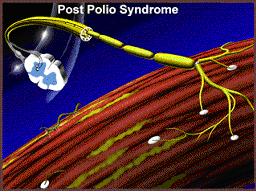Difference between revisions of "Post Polio Syndrome"
| Line 79: | Line 79: | ||
It is very important for the survivors as well as the families to know about PPS. Support groups that encourage self-help, group participation, and positive action can be helpful. For some, individual or family counseling to overcome distress caused by the new symptoms and use of assistive devices. | It is very important for the survivors as well as the families to know about PPS. Support groups that encourage self-help, group participation, and positive action can be helpful. For some, individual or family counseling to overcome distress caused by the new symptoms and use of assistive devices. | ||
| − | [[Hindi | + | [[Hindi Translation]] |
Latest revision as of 21:36, 7 January 2012
A condition when there is new weakening of muscles which were affected by the polio virus after many years of the initial attack of poliomyelitis is called Post Polio Syndrome. The muscles which were unaffected previously may also get weakened during Post Polio Syndrome.
It is a slow progressing condition. It may occur after some emotional or physical trauma. It might be life threatening. Even the respiratory muscles weaken. It may result in aspiration pneumonia and under ventilation. Those who had experienced a severe bout of the disease are likely to have severe PPS i.e. Post Polio Syndrome, whereas those with minimal symptoms may have mild PPS. According to an estimate it affects 25% to 50% survivors.
Diagnosis
Testing can be done with the help of electromyography. This measures electrical activity in affected muscles. Other tests include:
- MRI scan
- Muscle biopsy
- Spinal tap
Symptoms of PPS:
- Fatigue
- Exhaustion
- Muscle weakness
- Muscle atrophy (stiffening)
- Painful joints and muscles
- Low back pain
- Sensitivity to cold and heat
- Sleep disorders
- Difficult breathing and/or swallowing
- Muscle twitching
There is no cure but certain management strategies can be adopted:
- Consult the doctor if experiencing increasing muscle weakness, exercise.
- Doctors may recommend non steroidal anti-inflammatory medications such as aspirin and ibuprofen
- Eat a well-balanced diet
- Be alert to the changes in the body
- Try to get proper amount of sleep
- Carefully notice new symptoms or any other gradual changes
- Pace yourself
- Use medical equipment such as canes or crutches or other adaptive medical equipment and prevent from falling.
- Avoid weight gain
- Alcohol use should be minimized
- Colds should be seriously taken care of.
- Get regular checkups for neuromuscular, circulatory and respiratory, as well as, muscle strength.
- Exercises causing pain, weakness or muscle fatigue should be avoided.
- Strengths and limitations should be well known.
- Get involved or continue with physical activities
- Consider possible changes to your lifestyle.
- Use judicious exercise under the supervision of an experienced professional.
Otherwise, the treatment therapy for PPS is to "take it easy."
It is very important for the survivors as well as the families to know about PPS. Support groups that encourage self-help, group participation, and positive action can be helpful. For some, individual or family counseling to overcome distress caused by the new symptoms and use of assistive devices.

